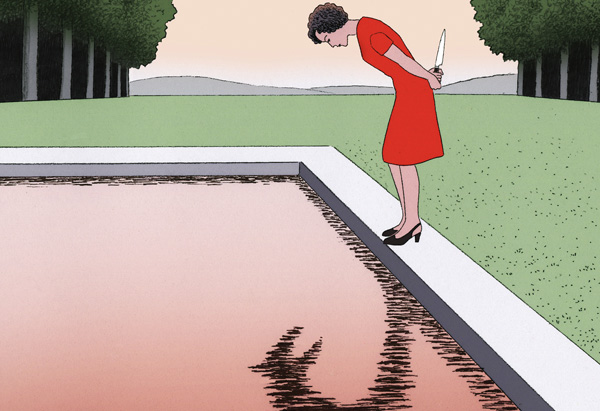8 Steps to Conquer the Beast Within
It's been tailing you for years—depression, a hot temper, an irresistible urge for cupcakes—appearing here and there, with no rhyme or reason. Or so it seems. Here’s how to track it, tame it, and vanquish it forever.

Illustration: Guy Billout
Right now I have two cliché pains: one in my neck and one in my butt. Both are the result of my learning to ride—and I use that term loosely—a horse. The butt pain is no big deal; just chafed skin. I'm told it can be avoided by wearing a padded undergarment, brand-named Comfy Rump, which I'm sure they carry at Victoria's Extremely Dark Secret. My neck pain, on the other hand, could mean trouble. It started when my horse jumped a little, causing my head to lash around on my vertebral column like a bowling ball on a Slinky. Though this was a new experience, the afterpain is all too familiar. You see, I have fibromyalgia, a chronic pain syndrome no one really understands. My neck may heal normally, or "fibro" may be triggered by the bruised tissue, making the injury debilitating.
Fibromyalgia is my bête noire, a French term for "black beast" that has come to mean something to be avoided because it frightens us or can cause us harm. Many of us have bêtes noires: dark moods (Winston Churchill called depression his "black dog"), addiction, self-loathing, a tendency to lurk in the shrubbery near former lovers' homes holding a machete in one hand and The Complete Works of Keats in the other. Whatever your bête noire might be, you may think it will ruin your life. I beg to differ. Like other wild animals, your bête can be studied, understood—even tamed. If you want to be the handler of your beast, instead of its prey, grab a pencil and prepare to learn a bête noire tracking exercise that I call the Lifeline.
Download the Lifeline graph here
Fibromyalgia is my bête noire, a French term for "black beast" that has come to mean something to be avoided because it frightens us or can cause us harm. Many of us have bêtes noires: dark moods (Winston Churchill called depression his "black dog"), addiction, self-loathing, a tendency to lurk in the shrubbery near former lovers' homes holding a machete in one hand and The Complete Works of Keats in the other. Whatever your bête noire might be, you may think it will ruin your life. I beg to differ. Like other wild animals, your bête can be studied, understood—even tamed. If you want to be the handler of your beast, instead of its prey, grab a pencil and prepare to learn a bête noire tracking exercise that I call the Lifeline.
Download the Lifeline graph here



